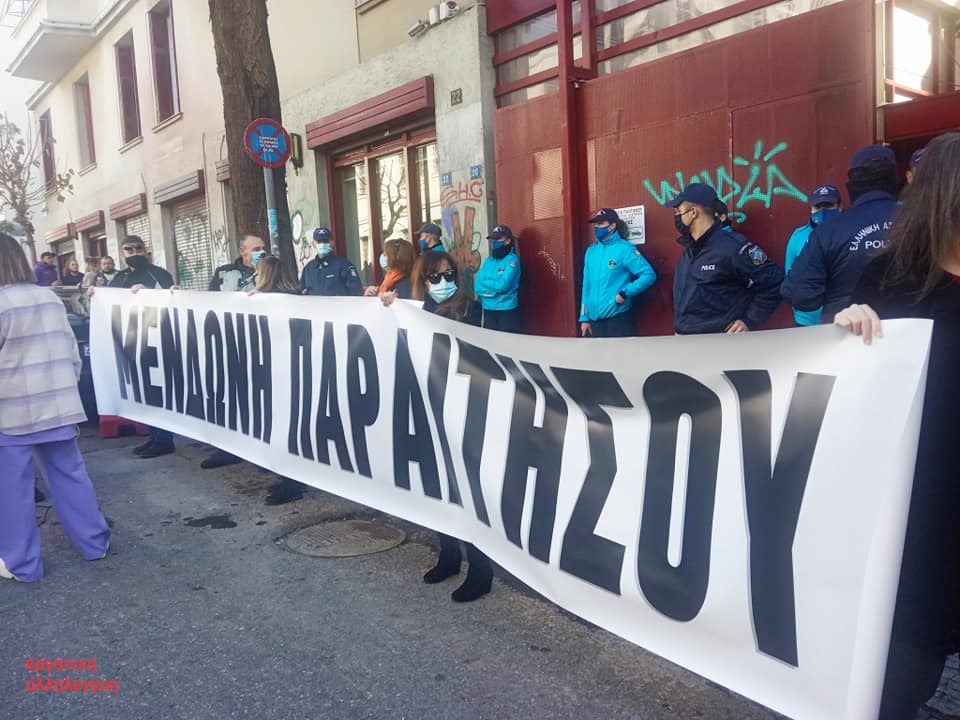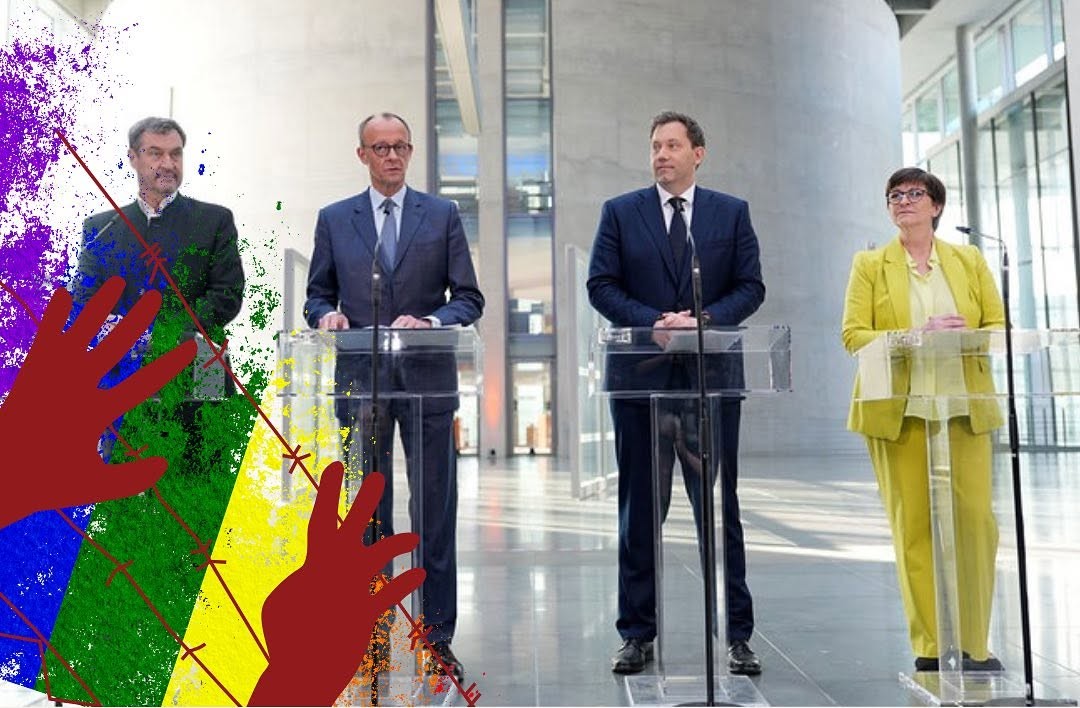Until 2021 Sophia Bekatorou was known as the leading sports woman in Greece. Olympic gold medal winner and world champion in sailing, she was the first female flag bearer for Greece in the history of Summer Olympics and generally a very popular figure in the country and worldwide.
The Facts
During a press conference in mid- January, Bekatorou revealed that in 1998 she had been raped by a senior member of the Hellenic Sailing Federation (HSF) in his hotel room, shortly after trials for the 2000 Sydney Olympics. The HSF initially tried to refute the accusation, but after Bekatorou named the perpetrator, they had to retreat and expel him. Within a few days, Aristides Adamopoulos was also expelled from the governing party, New Democracy (ND), whose loyal and honored member he had been for many years. Such a thing was unprecedented! The Greek #Metoo had just been born!
Public reception was positive from the beginning. The majority across the political spectrum rushed to issue “stand with Sophia” statements, declare solidarity with the victims and make promises to confront sexism and harassment. But the real change was happening in the minds and memories of people. And although in Bekatorou’s case the offense was beyond the statute of limitations due to the lapse of time, what followed was a landslide. An immediate reaction came from universities, where female students confirmed a vicious circle of harassment and intimidation from professors, who blackmailed with a pass or a higher grade for sex. Then came the media, a sector badly battered by financial crises and the accumulation of enterprises in the hands of a few moguls; here workers took a chance to reveal its horrors, with women publicly disclosing certain practices of direct and indirect violence.
But a real turning point was #Metoo reaching theaters. Actors, artists and workers in art production comprise a big community with a militant tradition. The Union of Greek Actors (SEI), was strengthened in the year of the pandemic. SEI has been in the forefront of the struggles against the total neglect of their work and means of living by the Greek state, demanding that the government supports art workers financially and practically. For this reason, they plucked up courage to come out quickly denouncing publicly all sorts of sexist, abusive, or plainly authoritarian behaviors. Needless to say that these came from theater bosses, producers and company directors, i.e. people with power over the lives of the victims. Accusations started with actresses, but soon they expanded to actors: men, gay men, immigrants and refugees, and a number of cases who claim that at the time of the raping they were minors! For a couple of weeks testimonies of traumatic experiences were circulating on social media about a “famous actor and director” as the perpetrator of repeated rapes.
Last week (20.02.21) the general director of the Greek National Theater, Dimitris Lignadis was arrested for multiple accusations of sexual abuse, pedophilia and child rape. While rumors were pointing the finger at him, the minister of Culture, neoliberal boss Lina Mendoni, insisted on defending him vehemently, …until he submitted his resignation just before his arrest.
The Crisis of the Government of New Democracy
The political repercussions of this event are a blow for the government of New Democracy and PM Kyriakos Mitsotakis, whose personal choice was Lignadis (he was directly appointed, surpassing the legal procedures for selecting the Head of the National Theater). It is even worse: Lignadis had been promoted as a symbol for the right wing in Greece as a nationalist intellectual, challenging the long hegemony of the Left in Theater and arts. He had served these aspirations perfectly, with open attacks to the “pseudo left” (his own term), with his obsession with ancient Greece, the re-instatement of theater personalities such as Nazi collaborator actress Eleni Papadaki, who was executed during the civil war, and other political manifestations adored by conservative audiences. He presented himself as both unconventional and part of the establishment, and for years that looked cute and clever. His fall and the way it happened destroyed not only him, but also the entire narrative he had built. Now the Emperor has no clothes…
The government of New Democracy survived the first wave of Covid -19 pretty well. From the summer of 2020 everything they did was obviously wrong, resulting in a full health crisis and deep economic depression. Regardless of this they seemed to get along well, despite growing resistance from the working class and the youth.
They handled the declarations of Bekatorou cautiously, trying to present themselves as part of the Greek #Metoo. When Mitsotakis urged state support for Sophia and all the victims of sexual harassment, he did not expect that the accusations would burst in his own face.
Speaking of sexism and discrimination, New Democracy is part of the problem. Not only are they a right wing and conservative party, the traditional party of “Homeland – Religion – Family”, but they also make the life of women harder with their policies. They have cut salaries, removed benefits and positive arrangements for women, facilitated lay-offs by bosses, and by dismantling social services, public health and education the conditions for women have deteriorated. Last year the government endorsed organizations for the “right of the unborn baby”, challenging the right to free and safe abortions. This caused outrage. Now they are preparing a law enforcing joint parental custody to replace the existing one which appoints the mother for child custody. They voted against all gay rights: civil partnership, Gender Recognition Act; their representatives hardly distinguish between homosexual orientation and abnormality.
In the case of Lignadis, ND were probably aware of his activities, as he was a notorious abuser in theater circles, but they did not care as long as they were kept secret. When the scandal exploded, they declared that they “had been cheated by his fine acting” and of course they denied that he was the PM’s friend. Minister Mendoni implied that the scandal was made up to victimize her, because she has been the minister engaged in neoliberal projects such as the sellout of Greek museums and the privatization of archeological sites.
In the meantime, Lignadis does not look like he is accepting his fate. He has hired the most notorious -though successful- defense attorney in the country, a racist and sexist thug who has managed so far to get dozens of infamous criminals acquitted, like the policeman who murdered 15 year old Alexandros Grigoropoulos in 2008. Alexis Kougias is vulgar and relentless against his rivals. His first declarations stated that his client is innocent and plainly targeted by “professional homosexuals”, people who allegedly make a living of their sexual orientation.
But the case is not another keyhole story, but rather a hard social and political fight. Greek society stands for the first time face to face with the sexism within its ranks, and so far it looks like the oppressed are winning.
Why now?
Initially this sort of question came from those skeptical about #Metoo. “Why did Bekatorou refresh her memory now?”, was a trivial remark coming from the tabloids and some macho lads in social media, implying that she was selfish enough to stay silent as long as she wanted to boost her career, only to remember that she can take revenge 22 years later.
Interestingly, these kind of rotten comments soon became a boomerang for those who expressed them. The spontaneous answer is: “Because of sexists like you”, but sexism and oppression are to be found in all spheres of life. Rape and abuse stayed secret for decades, because the dominant ideology blamed not the rapists but the victims for provoking them. Women’s organizations have reported that hardly 10% of rape cases ever reach the court rooms. The police and justice system make it a nightmare for rape victims to stand up against their abusers and most trials end with soft punishment or even acquittal for the rapists, especially if they are members of the ruling elite and a public intimidation for the raped and their families. According to a recent poll, 85% of Greek women have experienced some sort of sexual harassment in the workplace. Considering soaring unemployment, austerity and the dismantling of the welfare state; standing up against the boss requires financial independence and confidence, which the majority simply can’t afford. Therefore silence, embarrassment and self blaming are the dominant feelings which lead to a sort of cynical trivializing of the situation as a “natural law”. But it’s not natural at all. What is it then?
Oppression and Resistance
This brings us to the roots of the problem. There is a common cliché describing Greece and generally the European South as a haven of machismo, attributed to qualities such as underdevelopment and poverty or even …the Mediterranean mentality and psyche. But the narrative that Greece has plainly been stuck in good old patriarchy ignores a rich history of class and emancipation struggles within Greek society. The women of the working class have been protagonists in these struggles from the dawn of the 20th century, to resistance in WWII and the civil war that followed, and later, in the movement that brought down the military regime of 1967-74, until today. They built trade-unions and organized strikes. Their struggles and demands forced the social-democratic government of PASOK to modernize legislation with a law in 1983 declaring full equality between men and women, abolish backward institutions like dowry, abolish arrest for adultery (!), legalize abortion and introduce family planning. However, equality was achieved only in theory.
Oppression didn’t wither away and Greek women continued to face discrimination and everyday sexism, occasionally dressed up in new clothes and lifestyle, but in essence little changed. Conservative attitudes were promoted by almost all governments and institutions like the powerful Orthodox Church, which insists that the country has to stick to its old good traditions. It benefits, of course, the capitalist class, which needs women in production and in the family, but not equal and confident. Violence and rape confirm that women will continue to play this role, that’s why the establishment always fails to punish the doer and silence preserves the vicious circle. Hand in hand in the same context goes homophobia as a by-product of sexism, and lies behind assaults and discrimination against LGBT+ people.
Things started to change in the first years after 2000. The movement against capitalist globalization played a significant role, especially for the re-emergence of the LGBTQ+ movement in Greece. Recent years saw the re-appearance of massive Pride demonstrations and the development of actions and struggles which challenged sexism and oppression. In the last years, the women’s movement has been on the offensive as well. The American #Metoo campaign made a huge impact, and the women’s strike in Spain 3 years ago was an inspiration in Greece. They sparked actions of resistance to oppression and shaped the consciousness of a new generation, not to feel ashamed, but to speak out and organize to fight back. For the last two years the 8th of March has been a work stoppage and a big event. As for the artists, their mobilizations and experience of solidarity for an entire year provided the fertile ground, on which the encouraging example of Bekatorou sparked the fight against the abusers. It is doubtful that ten years ago we would have witnessed the same reactions.
But whereas the way of thinking of ordinary people has moved towards more radical ideas concerning gender and sexuality, the establishment (bourgeois parties, government officials, media) and the public discourse dominated by them seemed to be stuck in the past, to a time when rape victims would shut up and disappear and sexist behaviors would be tolerated. This time it has been impossible for them to turn the clock back. They have had to endorse Bekatorou and sack Lignadis. The sexist accusations of his lawyer have already been denounced by so many people who state “we are all professional homosexuals”. Artists demonstrate outside the ministry and demand that Mendoni resigns as well.
In this atmosphere, the 8th of March looks like it will be a huge event, one that will encompass the thunderstorm we experience and the big changes that the Greek #Metoo has brought.



